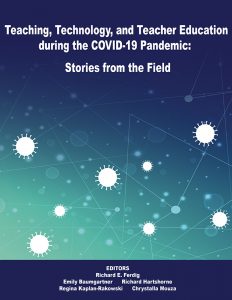Book Review: Teaching, Technology, and Teacher Education during the COVID-19 Pandemic: Stories from the Field.
A new eBook was just released and provides particularly relevant research to the world we find ourselves educating in. This eBook is titled: Teaching, Technology, and Teacher Education during the COVID-19 Pandemic: Stories from the Field. The editors of this eBook are: Richard E. Ferdig, Emily Baumgartner, Richard Hartshorne, Regina Kaplan-Rakowski, and Chrystalla Mouza.
This eBook is a uniquely timely publication given the continued impact of COVID-19 on education, especially as we prepare for the Fall semester. A fast ‘medical model’ approach to the peer review process was used. The editors went from a ‘request for papers’ to publication of a book in about eight weeks.
This publication focuses on both pre-service and inservice teacher education and professional development. The eBook is made up of 133 chapters divided into seven categories (further described below). The chapters are brief (ranging from about 4 pages to 6 pages). Each chapter has the same general format, including a unique Innovation section to help others visualize and replicate what authors did during pandemic, and a particularly important Implications section which the purpose of providing straightforward and practical implications for the audience, specifically focusing on preservice teacher educators and/or inservice professional development.
Brief descriptions of the seven categories are included below:
- Online Pedagogical Strategies– This category focuses on the use of new pedagogical strategies in online education, ranging from theoretical frameworks that support the transition of face-to-face learning strategies to online delivery and strategies for online learning and assessment.
- Community and Collaboration– This category focuses on ways to build communities characterized by collaboration with school systems and institutions of higher education. Chapters include information on the development of school/university partnerships and use of social media to connect educators, along with other relevant topics.
- Alternative Field Experiences in Pre-Service Teacher Education– Field experiences during COVID-19 have had to be reevaluated and reworked, since the typical placement of preservice teachers in physical classrooms working alongside inservice educators was no longer available. The chapters in this category focus on innovative and alternative approaches to field experiences.
- Pre-Service Teacher Education Methods and Pedagogy– Content-specific methods courses help preservice teachers develop knowledge and skills needed to teach within a discipline. These chapters focus on new and innovative pedagogical approaches for helping preservice teachers develop skills needed for teaching within a discipline.
- K-16 Educator Professional Development– During the time of COVID-19, professional development remains a critically important essential way for teachers to be able to be familiar with the new developments in theory and practice. These chapters focus on providing effective and innovative professional development opportunities to educators in both K-12 and higher education settings.
- Digital Tools– This category includes chapters that focus on providing guidance on the use of digital tools in the online learning environment in pedagogically-sound ways.
- Equity Issues– The chapters in this category provide preservice and inservice teachers with information and tools to meet the diverse needs of all learners. Specific topics in this category include: the digital device, the technocentrism trap, assistive technology solutions, and well-being.
As a co-author on one of the chapters, I experienced a fast-moving review process, with incredibly helpful feedback and collaboration from experts in the field. The chapter that I was a co-author for is part of the K-16 Educator Professional Development category. The chapter is titled: Tutoring in Online Environments: A Topic for Professional Development (Devers, Devers, Miller, & Alayan). Our chapter focused on professional development related to tutoring in online environments and the unique opportunities that online tutoring can provide low performing students.
I look forward to taking time to read through these chapters and learn from researchers and educators who are leading the way for innovative approaches to education and professional development during a global pandemic.
Access the book for free in LearnTechLib, the learning and Technology Library.
The COVID-19 pandemic significantly impacted education, forcing teachers and teacher educators into emergency, remote instruction. While there were noted challenges, there also were global success stories of innovation in preparing current and future teachers. This AACE and SITE-published, open access eBook contains 133 chapters with over 850 pages documenting best practices, strategies, and efforts by teacher educators, professional developers, researchers, and practitioners. It is divided into seven sections that address pedagogy, collaboration, field experiences, preservice education methods, professional development, digital tools, and equity issues. Chapters are presented as innovations with supporting materials that could be easily replicated or studied.
Ferdig, R.E., Baumgartner, E., Hartshorne, R., Kaplan-Rakowski, R. & Mouza, C. (2020). Teaching, Technology, and Teacher Education during the COVID-19 Pandemic: Stories from the Field. Association for the Advancement of Computing in Education (AACE). Retrieved August 3, 2020 from https://www.learntechlib.org/p/216903/.


